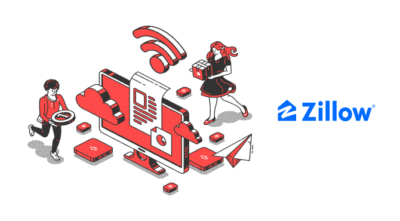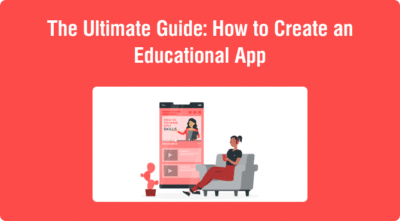How to Make a Website Like Airbnb


It’s no secret that Airbnb has revolutionized the way people book accommodations when traveling.
Airbnb is an online platform that allows people (and organizations) to list and rent out their properties to travelers, connecting hosts and guests worldwide. After more than a decade in operation, Airbnb has become a household name, providing a unique travel experience, having hosted over 1 billion guests with over $50 billion in revenue in 2022.
The success of Airbnb has led to the creation of a number of similar businesses with similar websites like Booking.com, Vrbo, and HomeAway, just to name a few. So, if you’ve ever wondered whether it’s possible to build a website like Airbnb, the answer is a resounding yes, and you’ve come to the right place.
In this article, we will guide you through the essential steps involved in creating a website like Airbnb, as well as important considerations you should have on how to promote and run the business.
By the end of this article, you’d have learned about the following:
- Planning the right strategy to start building an Airbnb-like website
- Creating a working business model for your Airbnb-like platform
- Choosing and using the right tech stack to develop a website like Airbnb
- Defining the MVP features needed for the website’s initial launch and implementing them
- Monitoring performance and ensuring continuous improvement
- Promoting your website and getting more users
And more.
Without further ado, let’s dive into this journey on how to make a website like Airbnb and achieve success!
Starting an Airbnb-Like Business: Feasibility StudyIs it feasible to start a business like Airbnb in 2024?
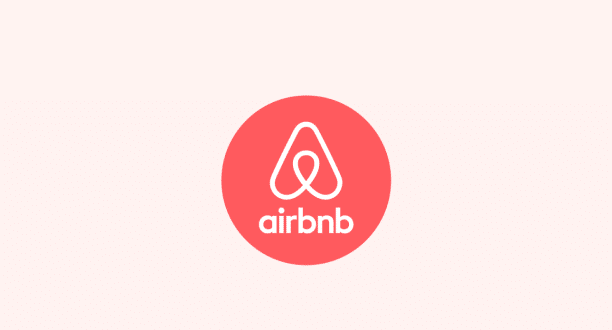
According to a recent report by Grand View Research, the global vacation rental market has a market size of $76.64 billion in 2021 and is expected to grow at a CAGR (compound annual growth rate) of 5.3% to reach $119 billion by 2030. Airbnb is a clear leader in this industry, having generated over $50 billion in revenue in 2022.
So, starting a business in the industry can definitely be feasible and can be a lucrative opportunity to achieve success. Despite Airbnb’s dominance, as well as the competition from other players like Booking.com and Vrbo, there is room for new entrants, especially if you can differentiate yourself in one way or another while creating your Airbnb-like website.
Here are the key factors to consider:

- Market Research. It’s critical to conduct thorough market research to understand the demand and competition in the area you are targeting. The research can help you identify opportunities, define your UVPs (unique value propositions), and plan the right strategies.
- Legal Considerations. Make sure to understand the legal and regulatory landscape surrounding property rentals in your target market (local zoning laws, licensing requirements, permits, tax obligations, etc.) They can add to your business expenses and may affect the business’s feasibility.
- Business Model and Revenue Streams. Determine how you are going to generate income. Is it through listing fees? Commissions on bookings? Offering premium subscription plans? Develop a working pricing strategy that aligns with your target audience.
- Platform Development. Do you have the necessary technical skills to build a website like Airbbnb and make it robust and scalable? You may need to hire a competent development team or partner with a technology provider.
- Marketing and User Acquisition: utilize the right marketing channels and tactics to attract hosts and guests to your website.
- Scalability: how will you grow the business? If you can’t continuously grow your user base (for both property hosts and guests), it will be very difficult to sustain the business.
It’s important to do your research and have a solid plan in place, but it’s definitely possible to start a successful business like Airbnb in 2024 and onwards.
Step 1: Make a Website Like Airbnb: Strategic PlanningBefore we delve further into the development process for the website, it’s crucial to first plan the right strategy to ensure the success of your venture. This involves the following steps:
1. Understanding the Target Audience and Market Demand

A very important foundation before starting your business and developing an Airbnb-like website is to understand who your target audience is going to be. Will you be targeting luxury vacationers, budget travelers, or a niche market segment? Try to understand who your potential guests are, what they are looking for in their rental property, and where they are located.
2. Conducting Market Research and Competitor Analysis

Once you have a good basic understanding of your target audience and the available market demand, it’s best to conduct market research and competitor analysis as the foundations for developing a successful strategy.
You can:
- Conduct surveys, interviews, and focus group discussions with potential hosts and guests.
- Analyze available market data (i.e., by reading industry reports) to confirm whether there is enough demand for vacation rentals
- Analyze your competitors (Airbnb, Vrbo, and others) to see what they are doing well and where they could improve.
Doing this analysis will help you identify gaps in the market and opportunities before building an Airbnb-like website to develop your unique value proposition and differentiate your platform from existing players.
3. Defining Unique Value Propositions

Based on the analysis results, you need to develop unique value propositions (UVPs)
Your UVPs are the unique values and benefits your website offers that your competitors don’t. What makes your website unique or better than the competition?
Your UVPs could be exclusive property offerings, a unique focus on a niche market, better customer service than your competitors, innovative features, and so on.
Clearly articulate how the created Airbnb-like website solves your target audience’s unique pain points, enhances their vacation experience, or provides more convenience.
Step 2: Creating a Working Business ModelNow that you have a clear understanding of your target market, it’s time to create a working model for your Airbnb-like business.
A business model is, simply put, a blueprint for how your business will generate revenue. Developing a business model involves four main steps:
1. Identifying Revenue Streams and Monetization Opportunities

The first step in creating a successful business model is to identify your revenue streams — how you can generate money through the soon to be developed Airbnb-like website.
For a vacation rental website like Airbnb, there are a number of potential revenue stream options you can consider:
- Host Fees: charging your property hosts a percentage of each booking as a ‘fee’ for using your website as their platform to list their properties.
- Guest Booking Fees: you can also charge your guest a fee for each successful booking made through your Airbnb-like website.
- Subscription Plans: you can offer special perks and features to hosts in premium subscription plan(s) with a recurring fee.
- Advertising: offering travel service providers or other businesses in your area to display targeted advertisements on your website/platform.
- Value-Added Services: you can also offer additional services to hosts or guests, such as cleaning services, professional photography, concierge service, etc., for an extra fee.
2. Developing a Pricing Strategy and Fee Structure

Once you’ve decided on which revenue (streams) you will adopt, you should determine how you will set prices for your services on the Airbnb-like website you’ll create. Consider factors such as the type of property being rented, the location, amenities, market demand, length of stay, and so on.
Some considerations:
- Strive for a pricing structure that is attractive to both hosts and guests but, at the same time, can ensure profitability and sustainable revenue for your business
- Decide whether to charge a flat fee or a percentage of the booking price for both host fees and guest booking fees. They can differ from each other. For example, you can opt for a percentage-based model for host fees, while guests pay a fixed fee per booking.
- When offering subscription plans for hosts, create tiered options with varying features. Try to address different budgets and host needs.
3. Defining User Acquisition and Retention Strategies

User acquisition refers to how you will attract new hosts and guests to your website or platform, while retention focuses on keeping your existing users. When you deal with building a website like Airbnb, both are equally important and deserve comprehensive strategies on their own.
Consider:
- Offering a free trial
- Running marketing campaigns across different digital and offline channels (social media advertising, content marketing, SEO, etc.)
- Consider running referral programs to incentivize your existing users to refer your website to their friends and colleagues.
- Always aim to provide excellent service: seamless user experience, timely and responsive support, and loyalty programs that reward frequent users to maximize retention
- Regularly analyze and respond to user feedback, and fine-tune your website to enhance user satisfaction
4. Building a Scalable Business Model

How will you grow and scale the business over time after you’ve developed a website like Airbnb?
It’s critical to plan and build a scalable business model that allows for future growth from the get-go.
You should:
- Build a robust and flexible infrastructure that can handle growth, both in terms of increasing user traffic and increasing transaction volumes
- Invest—or at least plan to invest— in technologies that enable scaling, such as cloud hosting, database optimization, load balancing, and more.
- Keep yourself updated with the latest market trends, shifts in user behavior, and industry developments. Adjust your business model and add new features/services accordingly.
Stay agile, and always be prepared to make strategic adjustments and optimizations to the Airbnb-like website you created if you plan on remaining competitive.
Step 3: Choosing The Most Suitable Tech Stack
The “tech stack,” short for technology stack, refers to the set of technologies and frameworks that you will use to build a website like Airbnb rather than building it from scratch.
Selecting the right tech stack is critical to make sure your Airbnb-like website platform is reliable and user-friendly.
Some popular tech stacks you can consider to develop websites like Airbnb are:
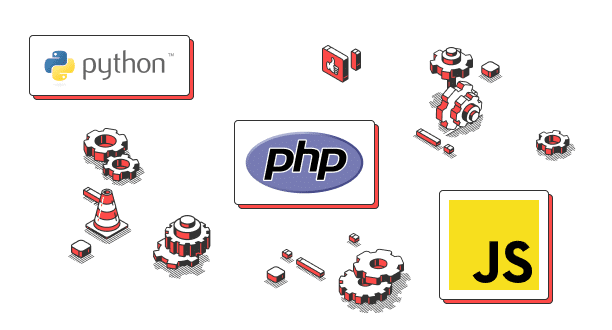
- Programming Languages: Python, Ruby, JavaScript, or PHP
- Web Development Frameworks: React, Ruby on Rails, Django
- Databases: MySQL, PostgreSQL, MongoDB
- Cloud Computing Platforms: AWS, Google Cloud, Microsoft Azure
When evaluating these technologies and frameworks, consider the following factors:
- The Size of Your Budget. The cost of the tech stack can vary greatly. If you are on a tight budget, for example, you can choose an open-source tech stack to make your Airbnb-like website.
- Your Team’s Experience and Skills. The tech stack you choose should be compatible with your team’s skills and experience. If your team is not familiar with a particular platform, it may hinder your progress.
- Scalability of the Tech Stack. Can you easily add new features and a number of users as your website/business grows?
- Security. It’s critical to choose a secure tech stack so your site and user data are protected from cyberattacks and hackers.
- Ease of Maintenance: it’s best to choose technologies and frameworks with good documentation and an active developer community. This will make it easier to troubleshoot issues, find support, and maintain your platform in the long run.
If necessary, consult with experienced developers or a web development agency like A2 Design when making these tech stack decisions.
Step 4: Developing Minimum Viable Product Features
The Airbnb-like website you’re building may not be perfect right away as soon as it is launched, but what’s important is to make sure it has all the MVP features to ensure user satisfaction.
MVP (Minimum Viable Product) is, simply put, the bare-minimum version of your website that includes all the must-have features your users can accept.
For a website like Airbnb, here are some of the essential features you should have as base requirements:
Ready to create your Airbnb-like website?
Contact Us1. User Registration and Authentication
Users need to be able to seamlessly sign up for an account and log in to your website/platform. Hosts should be able to use the account to manage their listings, and guests can use the account to book reservations, manage bookings, and leave reviews.
When developing a website like Airbnb, consider offering social network login options for more convenience (i.e., Google, Facebook, Twitter accounts).
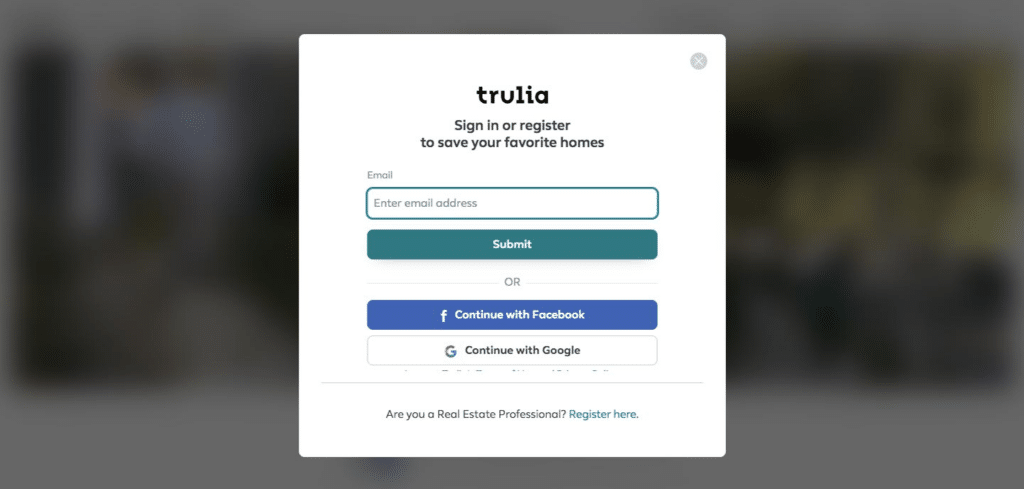
2. Guest and Host Pages
For a vacation rental website similar to Airbnb, we have two different types of users/visitors: guests and hosts. It’s critical for the platform to clearly differentiate user roles and provide different features accordingly.
Hosts (property owners) should be provided a page to list their properties with detailed descriptions and information, while guests (property renters) should be able to easily search for accommodations and make bookings.

3. Search and Filtering System
Guests need to be able to easily find listings that meet their preferences and needs with good search functionality. Enhance it with a variety of advanced features to allow users to refine results, for example, based on pricing, availability, number of rooms/beds/bathrooms, facilities, and more.
Consider adding more filters as needed.
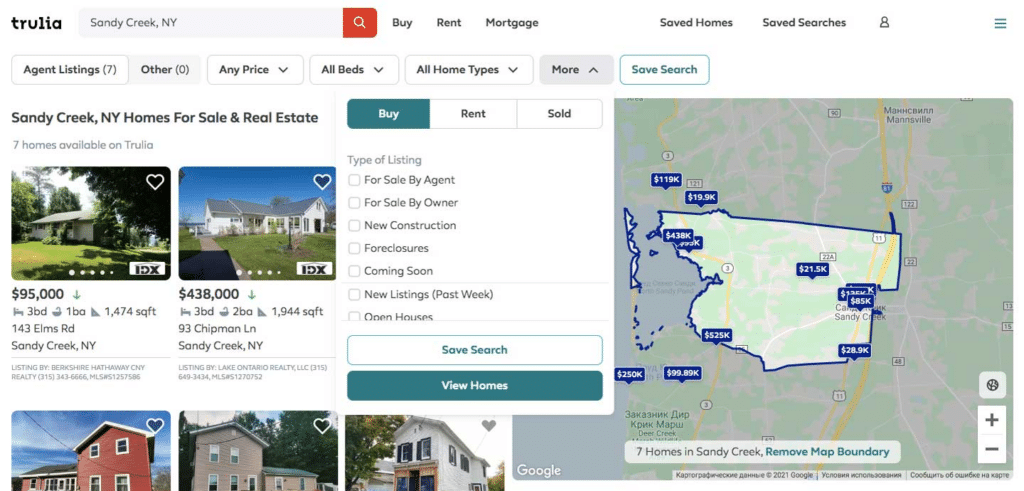
4. Booking and Reservation Functionality
Guests need to be able to easily book and reserve listings. Integrate secure payment gateways so users can safely and directly make payments on the Airbnb-like website you’ve created.
5. Property Listing Page
The property page is where hosts can list their properties, and guests can make their decisions about booking. So, it’s critical to provide comprehensive information for the properties.
On this page, enable guests to leave reviews and ratings for the properties they’ve booked. These reviews will help future guests and can help build trust and transparency within your website.
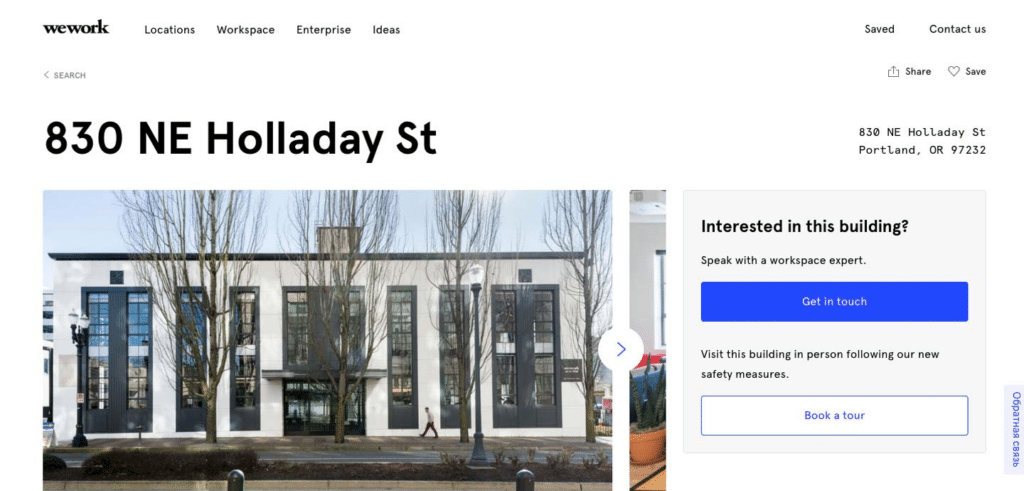
6. Messaging
Since the core function of your website is to bridge property owners (hosts) with renters (guests), a streamlined and reliable messaging system is critical for facilitating communication between them.
When building your Airbnb-like website, iImplement a user-friendly, secure, and efficient messaging system that allows users to easily ask questions about the property and coordinate logistics when necessary.
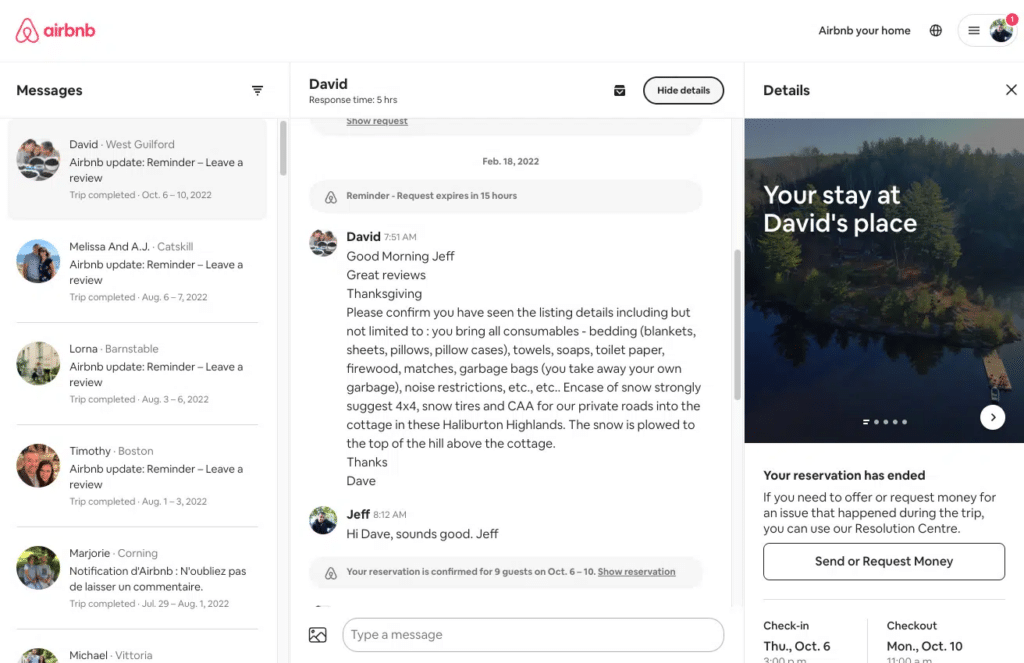
7. Map
Integrate Google Maps or other map platforms to help users find properties in their desired locations. This map function should clearly display the properties’ locations and allow users to explore nearby options.
Enhance user experience by providing relevant property recommendations similar to what users have viewed on the Map (or searched).
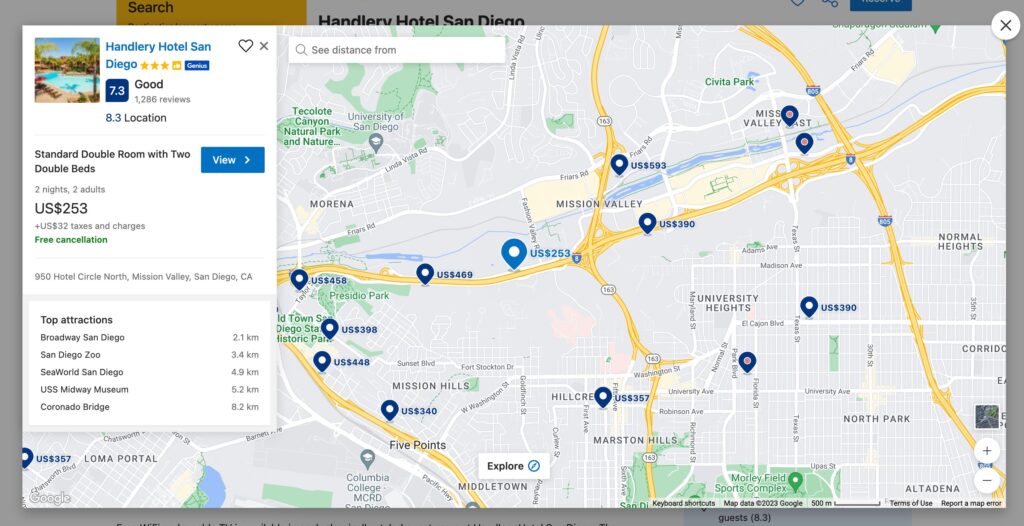
Identify the critical MVP features for your website according to your target audience’s unique needs. To develop these features, you basically have three different options:
- Building the Features Yourself: if you have the skills, time, and resources, then building the features yourself may be the best option that will give you the most control.
- Using a Third-Party Platform: there are third-party platforms like Wix, Weebly, WordPress, and others that may allow you to develop a website like Airbnb with the essential features you need.
- Hiring an Experienced Developer or Agency: if you don’t have the experience or resources, hiring a professional web developer or agency like A2Design can be the best option to help you develop these MVP features.
Vacation rental businesses are in high demand at the moment, and making a website like Airbnb can be very lucrative. While it might seem like a challenging journey at the beginning, it’s definitely worth embarking on.
In this guide, we have discussed all you need to know about how to build your own Airbnb-like website for renting vacation homes, and by now, you should have a solid foundation to start your business.
Yet, if you are still unsure about how to build your website, you can contact A2 Design for a free consultation. With years of experience in developing and supporting marketplace businesses, we can’t wait to be your partner in building your next successful venture.

- How to Build a Dating App like Tinder: Tips, Features, Cost
- How to Build a Job Search Website Like Glassdoor
- How to Build a Real Estate Website Like Zillow
- How to Build a Website Like eBay: A Complete Development Guide
- How to Build a Website like Turo: Tips, Features, Costs
- How to Create an e-Learning Website Like Udemy or Coursera
- How to Make a Website Like Airbnb

